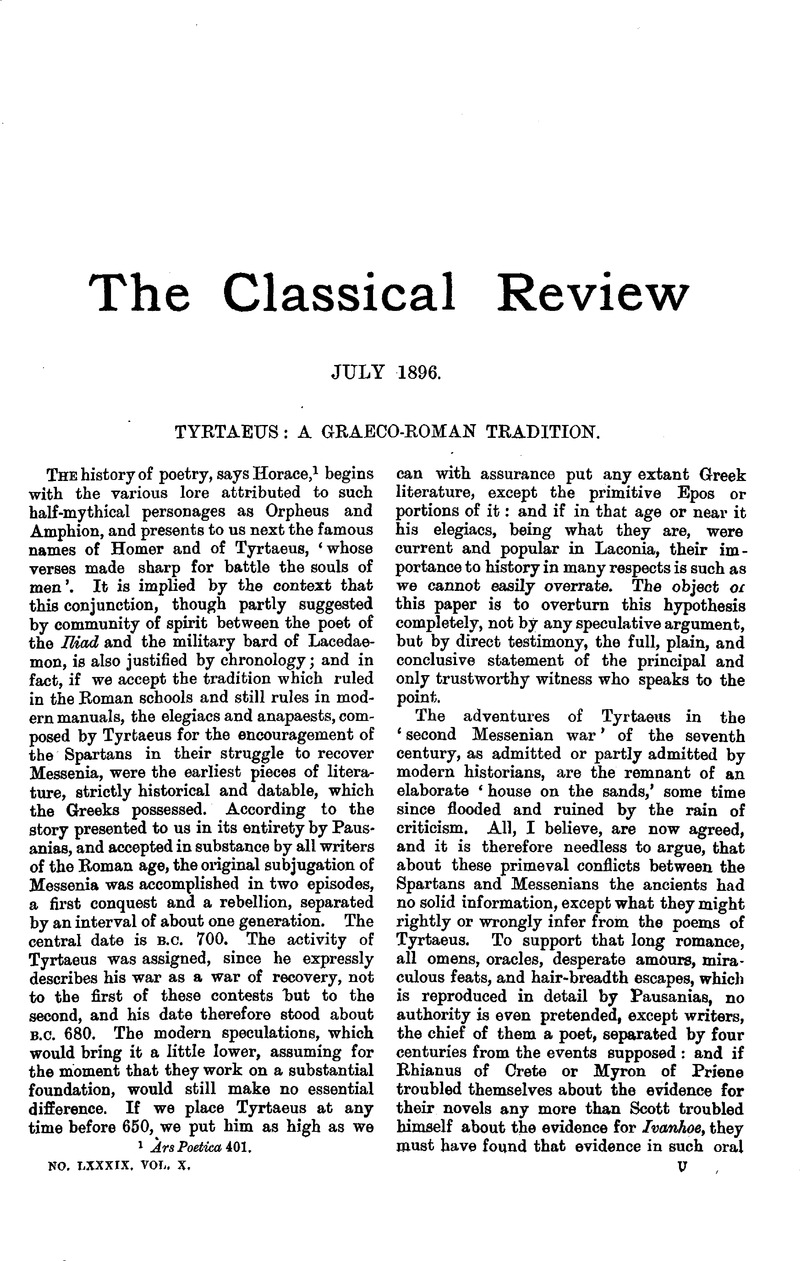No CrossRef data available.
Published online by Cambridge University Press: 27 October 2009

page 269 note 1 Ars Poetica 401.
page 270 note 1 See for example Beloch. Gr. Geschichte, vol. i. p. 284. Those who (as Prof. Holm and Mr. Abbott) condescend to repeat the narrative of Pausanias do so under reservations effectually destructive ; and in fact there ia no controversy about the matter.
page 270 note 2 The date of Myron cannot be fixed, but that he was an author of the same kind and standing as Rhianus is plain from the account and treatment of him in Pausanias.
page 270 note 3 Lycurgns, pp. 162–163, c. Leocr. §§ 102–109.
page 272 note 1 As to the order of the words see Kühuer Gr. Grummar § 464, 8. The example would fall under his class d, ![]() (Xen, Hell. 5, 2, 4),
(Xen, Hell. 5, 2, 4), ![]() (Demosth. Crown 197), etc. Two other arrangements would have been possible (1)
(Demosth. Crown 197), etc. Two other arrangements would have been possible (1) ![]() , and (2)
, and (2) ![]() but the first is cumbrous, and the second, though otherwise natural, was to be avoided from the cacophony of
but the first is cumbrous, and the second, though otherwise natural, was to be avoided from the cacophony of ![]() .
.
page 273 note 1 Politics 5 (8), 6, ![]() . In the second clause
. In the second clause ![]() is not explained by the context as it stands, since Tyrtaeus has not been cited before. It has perhaps slipped in from the preceding clause, where it is explained by a reference to Lacedaemonian history shortly preceding.
is not explained by the context as it stands, since Tyrtaeus has not been cited before. It has perhaps slipped in from the preceding clause, where it is explained by a reference to Lacedaemonian history shortly preceding.
page 273 note 2 The extant allusions are with scarcely an exception later than Leuctra, and after this begin (with Isocrates) immediately.
page 273 note 3 Laws 629 A.
page 273 note 4 Ib. 858 E.
page 274 note 1 It is perhaps worth notice that the passage about Tyrtaeus given in the scholia to the Laws is itself, like the text, perfectly consistent with his true date. Probably this is accidental; but it is not impossible that the note, which bears no certain mark of modernity, is as old as the Laws or indeed—for it has no special bearing on Plato—even older.
page 274 note 2 4, 15, 1.
page 274 note 3 Frag. 3 ![]() . The attempt to make out of this phrase something definite in the way of chronology is properly abandoned by Beloch, Gr. Geschichte, p. 285 (note).
. The attempt to make out of this phrase something definite in the way of chronology is properly abandoned by Beloch, Gr. Geschichte, p. 285 (note).
page 274 note 4 Philochorus, with Callisthenes and others (according to Strabo). For the birthplace they are cited distinctly ; what more, if anything, comes from them we cannot say, and indeed it would be unsafe to assume that Strabo cites at first hand.
page 276 note 1 Laws 629 B.
page 276 note 2 On the materials for the ‘first’ and ‘second’ Messenian wars, see Grote, part ii. chap. vii. Apart from Tyrtaeus, the only remark to which we may demur is that the account of Diodorus was ‘very probably taken from Ephorus—though this we do not know’. Ephorus undoubtedly did much mischief to genuine history, but the fictions admitted by the compilers of the Roman period are in this case so wild that no one, I think, should be accused of a part in them without positive evidence. The only ‘authorities’ certainly traceable are Rhianus and Myron, both of whom appear to have been simply ‘novelists’, and scarcely deserve to be brought into court.
page 276 note 3 Pausanias 4, 15, 6 ; 4, 16, 1.
page 276 note 4 Paus. 4, 15, 1.
page 276 note 5 Pausanias is content simply to discard this particular trait of Rhianus, and to discover another ‘contemporary king’ on principles of his own. Others (see the spurious genealogy inserted in Herodotus 8, 31) preferred, it seems, to invent an earlier Leotychides.